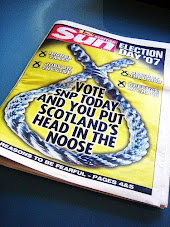So, as we begin the process of recognising ten years of the Parliament building, the presiding officer, Alex Fergusson has suggested it is time that we add another voice to the 24 writers whose words celebrate Scotland, are carved on the Canongate wall.
Of the snippets already there, Hugh MacDiarmid's 'Scotland Small?' is a personal favourite. Although it is carved in obscure text and difficult to see.

Scotland Small?
Scotland small? Our multiform, our infinite Scotland small ?
Only as a patch of hillside may be a cliché corner
To a fool who cries ‘Nothing but heather!’ where in September another
Sitting there and resting and gazing round
Sees not only the heather but blaeberries
With bright green leaves and leaves already turned scarlet,
Hiding ripe blue berries; and amongst the sage-green leaves
Of the bog-myrtle the golden flowers of the tormentil shining;
And on the small bare places, where the little Blackface sheep
Found grazing, milkworts blue as summer skies;
And down in neglected peat-hags, not worked
Within living memory, sphagnum moss in pastel shades
Of yellow, green, and pink; sundew and butterwort
Waiting with wide-open sticky leaves for their tiny winged prey;
And nodding harebells vying in their colour
With the blue butterflies that poise themselves delicately upon them,
And stunted rowans with harsh dry leaves of glorious colour.
‘Nothing but heather!’ - How marvellously descriptive! And incomplete!
However, the one that sums up a Scotland that is now thankfully on its last feet is the wondrous 'Scotland' by Alastair Reid, of New York, the Dominican Republic and Whithorn, also one of the finest men to ever draw breath, and whose company I've spent many a happy hour in.

Scotland
It was a day peculiar to this piece of the planet,
when larks rose on long thin strings of singing
and the air shifted with the shimmer of actual angels.
Greenness entered the body. The grasses
shivered with presences, and sunlight
stayed like a halo on hair and heather and hills.
Walking into town, I saw, in a radiant raincoat,
the woman from the fish-shop. ‘What a day it is!’
cried I, like a sunstruck madman.
And what did she have to say for it?
Her brow grew bleak, her ancestors raged in their graves
as she spoke with their ancient misery:
‘We’ll pay for it, we’ll pay for it, we’ll pay for it.’
Then again, MacDiarmid's diatribe against moral turpitude, fair gets the hairs up on the back of your neck.
"My aim all along has been (in Ezra Pound's term) the most drastic desuetization of Scottish life and letters, and, in particular, the de-Tibetanization of the Highlands and Islands, and getting rid of the whole gang of high mucky-mucks, famous fatheads, old wives of both sexes, stuffed shirts, hollow men with headpieces stuffed with straw, bird-wits, lookers-under-beds, trained seals, creeping Jesuses, Scots Wha Ha'evers, village idiots, policemen, leaders of white-mouse factions and noted connoisseurs of bread and butter, glorified gangsters, and what 'Billy' Phelps calls Medlar Novelists (the medlar being a fruit that becomes rotten before it is ripe),Commercial Calvinists, makers of 'noises like a turnip', and all the touts and toadies and lickspittles o the English Ascendancy, and their infernal women-folk, and all their skunkoil skulduggery. "
Can a Gray mouse lead a white mouse faction?
















